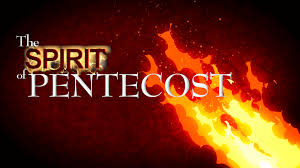The Promise
On Sunday we celebrated Pentecost Sunday. This marked the end of Eastertide and introduce the arrival of the Holy Spirit, the Spirit of Promise (Acts 1:4; Luke 24:49; John 14:16).
Many churches dressed their altars in red to symbolize the fire of Pentecost. This fire, the Holy Spirit, fell upon the apostles and early followers of Jesus who were gathered in the Upper Room (Acts 2:3). This fire would empower the apostles then and believers now to proclaim the Gospel throughout the world.
Pentecost marks the availability of the Holy Spirit to everyone who would “call upon the name of Jesus” (Rom. 10:13; Acts 2:38). Collectively, individuals responding in faith would form the Church promised by Jesus to His disciples (Matt. 16:18).
The Presence
While we may know about the various ministries of the Holy Spirit, it is even more important to fully grasp the enormity of His Presence within us. I love the way Jesus described this phenomenon in John 17:23 (NLT).
I in them and you in me—so that they may be brought to complete unity. Then the world will know that you sent me and have loved them even as you have loved me.
Imagine. We have deity living within us! Jesus in believers and God in Jesus. Why? So that we will be in complete agreement. Our will, our thoughts, and our lives operating together. And when the world sees us, they will see God and know how much He loves us.
Like the disciples on the day of Pentecost, we need the Holy Spirit’s power and direction as we live for God’s glory. Pentecost is not only a day on the church calendar, but it is also an invitation to join God in His ministry of deliverance, wholeness, and grace (Eph. 2:10).
Stormie Omartian, bestselling American Christian author, describes our partnership with the Holy Spirit this way:
God wants to lead you to places you cannot get to without Him, and He does that by the power of His Spirit. He can bring you into the realm of the miraculous—not as a show, but as a demonstration of His love and compassion for the lost, hurting, or needy. Who among us doesn’t want or need that?
The Glory
In meditating on the glory of Pentecost, the words of the hymn, “Blessed Assurance” echoes within my heart and mind:
Blessed assurance Jesus is mine
Oh, what a foretaste of glory divine
Heir of salvation, purchase of God
Born of His Spirit, Lost in His love.
This song captures in totality the work of salvation. It describes in its opening lines the work specifically of the Holy Spirit who gives us a foretaste of the glory that belongs to those who are in Christ.
“Foretaste” is made up of two Latin words: ante which means “ahead, before or previously” and gustus meaning “flavor, zeal” (this is where we get our word gusto). Foretaste is described as a taste before possession; a limited awareness of something to occur.
This is a good illustration of what the sealing of the Holy Spirit accomplishes. The Holy Spirit whets the spiritual appetite for those things which God has reserved for believers until the day we all shall see Jesus for ourselves (1 John 3:2). Paul referred to this time as the “redemption of the purchased possession” (Eph. 1:4).
In celebrating Pentecost Sunday, let us look forward to the time when we will be fully in the presence of God. While we wait, let God’s Spirit lead us to where we might witness and serve.
Let us not squander the promise, the presence, and the glory within us—the Holy Spirit. “This is my story, this is my song. Praising my Savior all the day long.”


